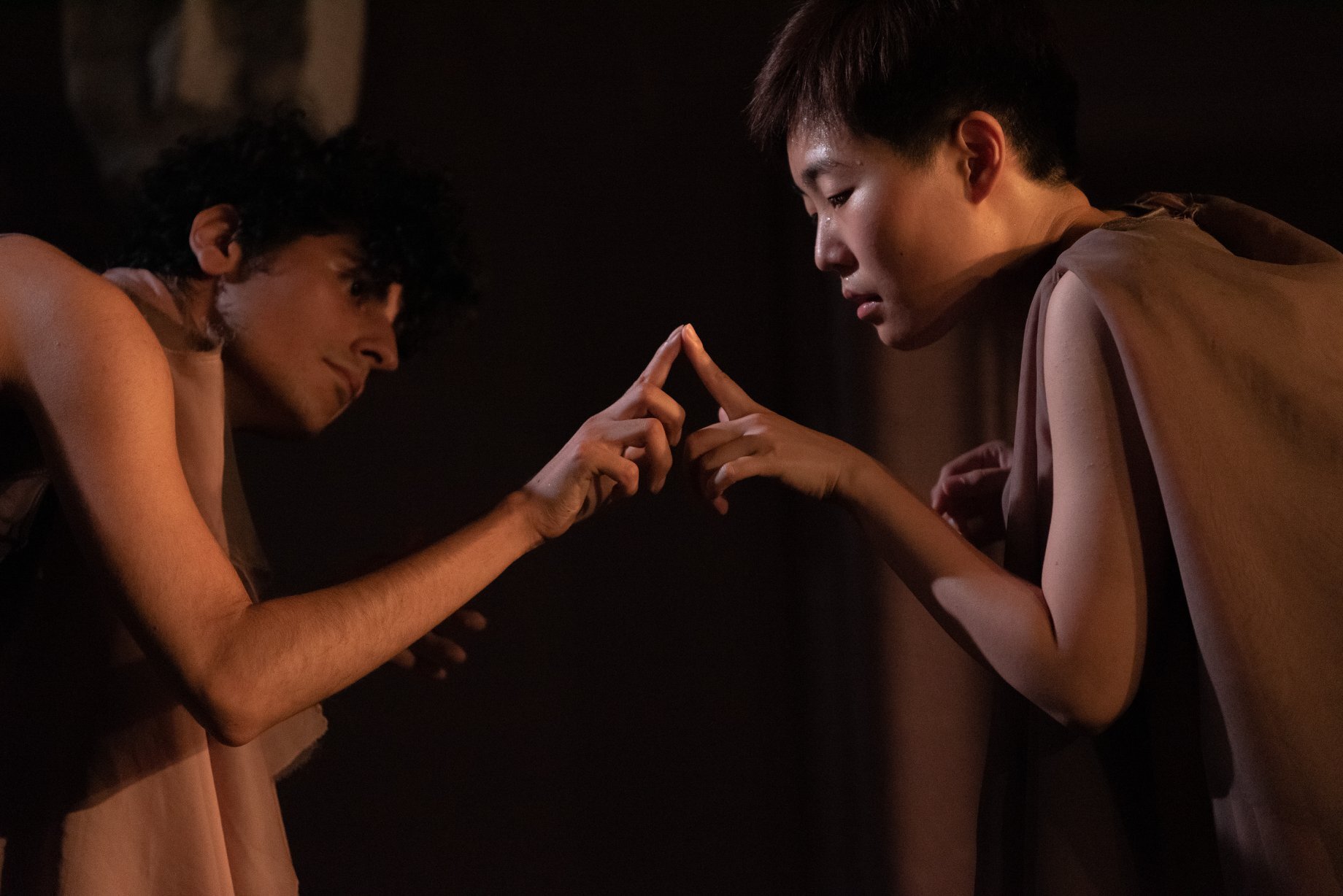Review of benjisun presents bodyssey, Yale Cabaret
What were you doing last night at 11 p.m.? Whatever it was, could it have used a bit more inspiring beauty, a bit more intriguing mystery? Then you should’ve seen benjisun presents bodyssey, the current show at Yale Cabaret (which has two more showings tonight at 8 p.m. and 11 p.m.). That’s what I did.
Devised, directed and performed by Benjamin Benne, a playwright, and Jisun Kim, a dramaturg, both at the Yale School of Drama and known, symbiotically, as benjisun, the show features no spoken language. It’s a staged performance piece in which movement and gesture interact with lighting by Nicole E. Lang and live sound—featuring a looper, a clarinet, and a two-string violin—by Emily Duncan Wilson. The tone, neither heavy nor light, provokes contemplation, as Benne and Kim enact living tableaux that take us on a journey—a body odyssey or bodyssey—from the beginning of life on earth to something quite cosmic.
The show begins with a kind of prelude in which shadow play sets up a visually striking dynamic: we see hands in light, and on the wall shadows that can morph from small to huge as one hand seems poised to engulf the other. Then Kim and Benne, garbed simply but elegantly by Phuong Nguyen, interact with cleaning implements while their shadows create a more lyrical vision. Which do you believe: the prosaic three-dimensional beings or their 2D renderings in light and shadow?
Now that they’ve got us in the mood to access what viewing—an active process as opposed to mere watching—does for us, Benne and Kim proceed to enact, first with hands, then with their entire bodies, the process by which protoplasm became sentient beings having two legs and expressive faces. An interlude under a kind of diaphanous pod, pulsing with light and the kind of movements most easily associated with birth—from an egg or amniotic sac or simply from one form of being to another—leads to two sequences I found utterly enthralling.
benjisun presents bodyssey at Yale Cabaret, October 3-5, 2019 (photos by Blaq Pearl Photography)
The first, in which the duo swim on the floor on their backs is accompanied by Wilson on clarinet and sound loops (and blowing bubbles) to create an aquatic sound that feels like the womb must have felt. So very relaxing, so serenely at ease. As James Joyce once wrote: “before born babe bliss had.” Like that. Featuring slow motion movement both very precise and very fluid, the segment is also quite beautiful to watch.
Next comes that moment when, as we all must, we depart from peaceful sleep, get born, or, y’know, crawl out of the primordial ooze. The sound here is like the sun on a day when you don’t want to wake that early or to so much light, or like being on a beach with no breeze. Wilson scratches those two strings and Kim and Benne try to get from supine to all fours.
Benjamin Benne and Jisun Kim in benjisun presents bodyssey, Yale Cabaret, Oct 3-5, 2019 (Blaq Pearl Photography)
Eventually they’re on two feet, and there comes a delightful segment of finger touching finger, testing the water, so to speak, of what another being feels like. There are also some gracefully portrayed fight or flight moments and, masked and armed with fans, a dance segment where they become a clownish couple. Maturity! The large masks are both comical and oddly expressive, making us see the pair as fully human, their movements fully self-conscious, bound by a certain obtuse presence they can’t escape.
Except . . . they sort of do. Back beneath the veil and out they come, faces alight like stars. Heavenly beings? Space travelers? Glowing sparks of remembered spirits? In any case, they appear as poetic expressions of that part of us we’d like to think isn’t wholly contained by this physical world or planet.
The artistry of the piece is a matter of the way all three—Benne, Kim, Wilson—work together, reacting and responding to each other, and provoking in the viewer responses that can be very individual and yet part of the overall experience.
The kind of theater Yale Cabaret provides can’t really be found anywhere else. An experimental space for student work, yes, but also a place where theater feels more communal, more centered in creative effort than commercial undertaking. And sometimes, like this weekend, it’s quite simply magical, a blend of sound, light, design, movement and physical presence that makes the theatrical seem elemental.
benjisun presents bodyssey
Created, Directed and Performed by Benjamin Benne and Jisun Kim
Live sound by Emily Duncan Wilson
Producers: Sarah Cain, Caitlin Volz; Scenic Designer: Jimmy Stubbs; Sound Designer and Composer: Emily Duncan Wilson; Costume Designer: Phuong Nguyen; Lighting Designer: Nicole E. Lang; Dramaturg: Zachry J. Bailey; Technical Director: Yaro Yarashevich; Stage Manager: Fabiola Feliciano-Batista
Yale Cabaret
October 3-5, 2019



